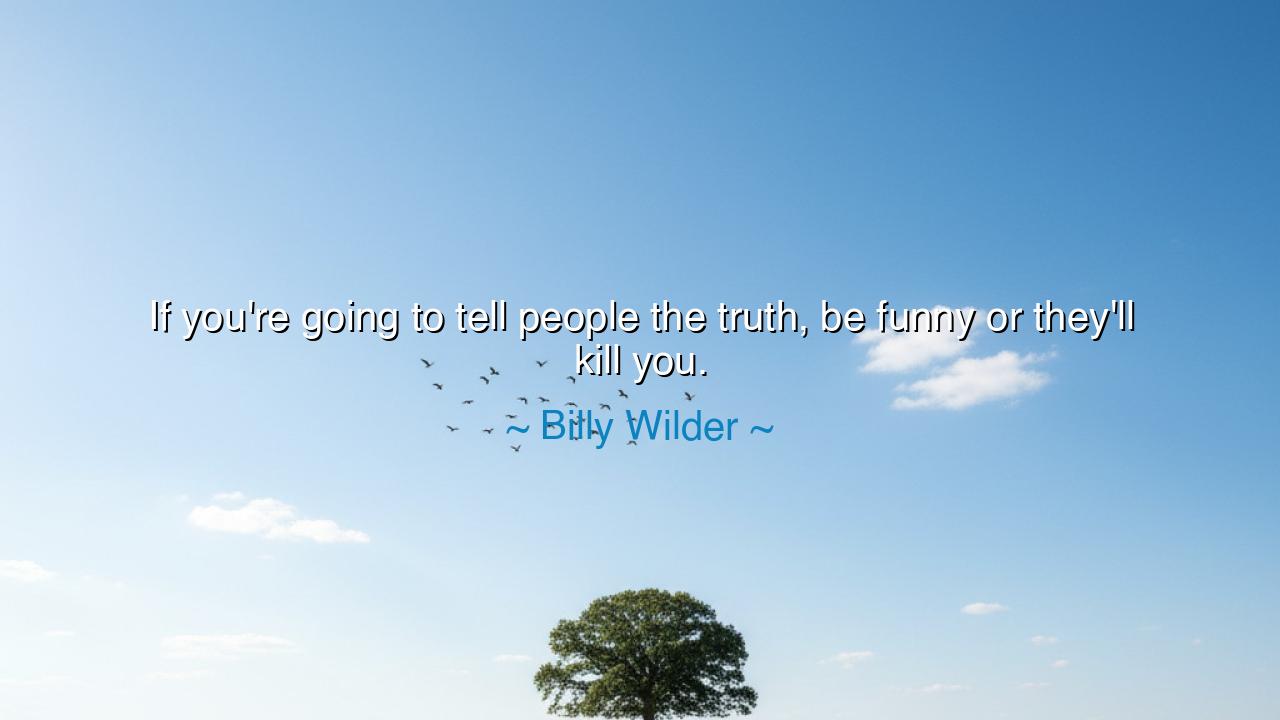
If you're going to tell people the truth, be funny or they'll






“If you’re going to tell people the truth, be funny or they’ll kill you.” Thus spoke Billy Wilder, the master storyteller who turned sharp wit into survival and truth into laughter. Beneath the sparkle of his humor lies a warning both ancient and eternal: truth is powerful, and power, when spoken plainly, can wound or provoke. But truth wrapped in laughter — truth clothed in humor — becomes bearable, even beautiful. Wilder’s words, though modern, echo the wisdom of the ancients: that the only way to speak hard truths and live to tell them is to deliver them with grace, wit, and compassion.
From the beginning of time, truth has been both weapon and light. The prophets, the philosophers, and the poets — all who dared to speak it — knew that truth unsettles. To expose falsehood is to threaten the comfortable illusions upon which societies rest. Socrates, who spent his life questioning the assumptions of his people, found this out when Athens condemned him to drink poison. He told truths that were too sharp, too direct, and too dangerous to those who preferred ignorance. If he had wrapped his lessons in laughter, if he had been the comedian as well as the philosopher, perhaps the cup would never have reached his lips. Wilder understood this well — that laughter disarms where logic alone cannot.
The art of comedy, in its highest form, has always been a vessel for truth. It is not born merely to amuse, but to reveal. Wilder himself lived through dark times: a Jewish filmmaker who fled Nazi Germany, he saw firsthand how deadly truth could become when it offended those in power. Yet rather than wield bitterness, he wielded irony. His films — like Some Like It Hot and The Apartment — disguised piercing social critique beneath layers of laughter. He spoke of greed, hypocrisy, and loneliness, yet audiences came away smiling. In that laughter, he planted the seeds of reflection. The truth, once feared, was now transformed into light — not less true, but more human.
This wisdom was not Wilder’s alone. The ancients too knew that laughter protects the messenger. The court jester of old could say what the noble dared not, mocking kings in their own halls without losing his head. His jokes were daggers of truth sheathed in mirth. The people laughed — and in that laughter, they understood. But when the truth is spoken without laughter, without warmth, it cuts too deeply; it breeds resentment instead of revelation. Thus Wilder’s teaching is not about deceit, but about delivery. It is not the hiding of truth — it is the art of making truth livable.
Consider also the story of Mark Twain, the American sage whose humor shaped his honesty. Twain spoke against racism, corruption, and hypocrisy, but he did so through laughter so rich that even those he chastised could not turn away. He said, “Against the assault of laughter nothing can stand.” Wilder’s words are the twin to Twain’s: both remind us that laughter is the gentle weapon of the wise — the bridge that carries hard truths across the battlefield of pride.
There is deep psychology in this, for the human heart resists direct confrontation. When told they are wrong, people raise their defenses; when made to laugh, they lower them. Laughter is the door through which truth enters unchallenged. To be funny, then, is not to trivialize truth, but to make it approachable, to sweeten the medicine so it may heal instead of harm. Wilder’s humor was not cruelty; it was compassion in disguise — the kindness of a man who wished to awaken the world without breaking it.
Therefore, my friend, take this as your lesson: if you must speak truth — and all noble souls must — do it with wit, not wrath. Let your words pierce, but let them also uplift. Let your humor be a shield against anger and a key to understanding. Remember that laughter opens the ears that truth alone would close. Whether you speak to one person or to the multitude, learn the sacred art of the jester — the art of gentleness, timing, and grace.
For the world does not hate truth — it fears it. And those who can make it laugh as they reveal it, those who blend honesty with joy, shall never be silenced. As Billy Wilder taught through his laughter and his courage: truth alone may wound, but truth with humor can heal — and live forever.






AAdministratorAdministrator
Welcome, honored guests. Please leave a comment, we will respond soon